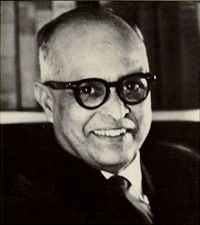
This novel completes the informal trilogy which began with "Swami and Friends" and "The Bachelor of Arts," The protagonist, Krishna, is an English teacher at the same college he had attended as a student. Although Krishna has recently married, his wife Susila and their daughter live with his parents-in-law some miles away. The story opens with his immediate family deciding to join him in Malgudi. Krishna is initially frightened by his new state of affairs, but he soon finds that his love for both his wife and child grows deeper than he could have imagined. "Mr. Narayan has repeatedly been compared with Chekhov. Ordinarily such comparisons are gratuitous and strained, but in this case there are such clear and insistent echoes that any careful reader will be aware of them. There is that sense of rightness which transcends mere structure. There is the inexplicable blending of tragedy and humor. Most of all, there is a brooding awareness of fate which makes the story seem not authored, but merely translated."—J.F. Muehl, "Saturday Review" "[Narayan] does not deal in exemplary fates, and the Western novel's machinery of retribution is far too grandiose for him... In Narayan's world, scores are not settled but dissolved, recycled, restated. 'Both of us will shed our forms soon and perhaps we could meet again, who knows? So goodbye for the present.' These are the concluding words for the novel "A Tiger for Malgudi," but they constitute a universal epilogue one could append to most of Narayan's fiction."—Russell Davies, "Times Literary Supplement"
Author

R. K. Narayan is among the best known and most widely read Indian novelists who wrote in English. R.K. Narayan was born in Madras, South India, in 1906, and educated there and at Maharaja's College in Mysore. His first novel, Swami and Friends and its successor, The Bachelor of Arts, are both set in the enchanting fictional territory of Malgudi and are only two out of the twelve novels he based there. In 1958 Narayan's work The Guide won him the National Prize of the Indian Literary Academy, his country's highest literary honor. In addition to his novels, Narayan has authored five collections of short stories, including A Horse and Two Goats, Malguidi Days, and Under the Banyan Tree, two travel books, two volumes of essays, a volume of memoirs, and the re-told legends Gods, Demons and Others, The Ramayana, and the Mahabharata. In 1980 he was awarded the A.C. Benson Medal by the Royal Society of Literature and in 1982 he was made an Honorary Member of the American Academy and Institute of Arts and Letters. Most of Narayan's work, starting with his first novel Swami and Friends (1935), captures many Indian traits while retaining a unique identity of its own. He was sometimes compared to the American writer William Faulkner, whose novels were also grounded in a compassionate humanism and celebrated the humour and energy of ordinary life. Narayan who lived till age of ninety-four, died in 2001. He wrote for more than fifty years, and published until he was eighty seven. He wrote fourteen novels, five volumes of short stories, a number of travelogues and collections of non-fiction, condensed versions of Indian epics in English, and the memoir My Days. -Wikipedia & Amazon.co.uk